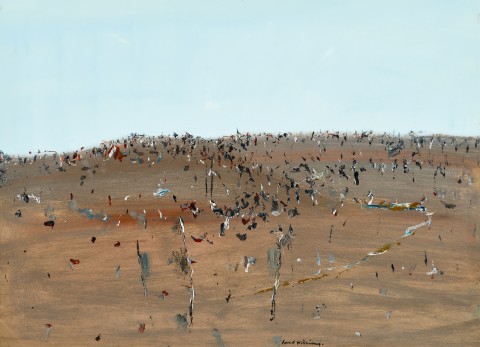LYSTERFIELD LANDSCAPE, c.1968
FRED WILLIAMS
gouache and watercolour on paper
53.5 x 74.0 cm
signed lower centre: Fred Williams.
Private collection
Sotheby’s, Melbourne, 22 April 1991, lot 261
Joseph Brown Gallery, Melbourne
The Cbus Collection of Australian Art, Melbourne, acquired from the above on 29 April 1991
Dawn to Dusk: Landscapes from the Cbus Collection of Australian Art, Latrobe Regional Gallery, Victoria, 31 May - 16 November 2014
Fred Williams and John Nixon - Reducing Landscapes, Latrobe Regional Gallery, Victoria, 21 March – 28 June 2015 and touring
3 Perspectives | Mary Tonkin, Fred Williams & Miles Evergood, Burrinja Gallery, Dandenong Ranges Cultural Centre, Melbourne, 15 May – 24 July 2021
on long term loan to Newcastle Art Gallery, New South Wales, prior to 2006
on long term loan to Gippsland Art Gallery, Victoria
Nainby, B., Stanhope, Z., and Furlonger, K., The Cbus Collection of Australian Art, in association with Latrobe Regional Gallery, Melbourne, 2009, pp. 17 (illus.), 237
Fred Williams’ distinctive interpretations of the Australian bush can be read as authoritative exercises in form and gesture, with the barest of markings summarily depicting its unique contours. His rejection of sentimental evocations of the landscape that were so popular with the Heidelberg school allowed a development of an alternative, semi-abstract vision of the landscape. In the late 1960s, Williams painted regularly in Lysterfield, an area which was then completely rural and easily reached from his home in Upwey. Its undulating countryside sustained a long creative period in Williams’ work, with varied views in gouache and oil containing many visual links to earlier motifs. Here he produced a distinct series in February 1968, in the immediate aftermath of a devastating bushfire whose path ran right up to artist’s home in Upwey. These powerful works were quite literal in their empty desolation.
Lysterfield Landscape, c.1968 is an expansive, almost birds-eye view of a ravaged landscape, its singed foundations laid bare in uneven washes of ochre and ashy ground. A sweeping arc of paint to in the centre left links this picture to Williams’ other views of Lysterfield, also painted on paper en plein air. The horizon line imperfectly bisects heaven and scorched earth, the grey hazy sky hanging low and quiet. The undergrowth stripped back by the fire, this Lysterfield Landscape leaves only singed and denuded tree trunks, clumped in a central copse at the base of the hill. These features are rendered with casual dots and brush marks supplemented by streaks of fresh local charcoal and textured traces of red madder embers. Of these works, Patrick McCaughey noted in his 1980 monograph: ‘It was as though the country were seen in negative and the fragmentary remains of the bush seen correspondingly with flickering brilliance and clarity, set off against the ground in pure hues’.1
Williams was awestruck by the transformed landscape, its ridges and furrows laid bare by the natural disaster. The personal experience of an environmental disaster on this scale was keenly felt by the artist, his awe feeding directly into a frenzied artistic output which produced masterpieces such as Burnt Landscape, 1968 and After the Fire, 1968 (National Gallery of Australia). The works on paper were painted very rapidly on site, with the artist working very freely and confidently in a rare instance of quick and methodical work, exorcising this traumatic vision and experience wholly onto paper and canvas.
1. McCaughey, P., Fred Williams, Bay Books, Sydney and London, 1980, p. 203
LUCIE REEVES-SMITH
